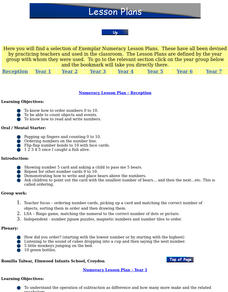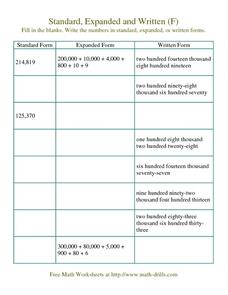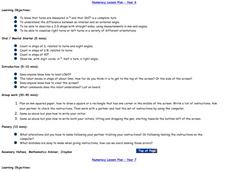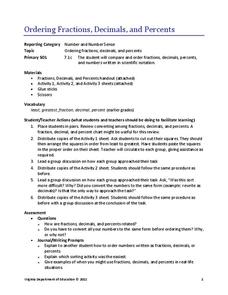Kenan Fellows
Weight and Balance of an Airplane
A career in aeronautics might be calling your class members. Building from the previous two lessons in the series, learners continue analyzing the mathematics of aeronautics. Groups create a paper airplane using paperclips for balance....
Curated OER
Brog-Cube-the Spam
A Middle school special ed class uses the acronym SPAM to learn the 4 parts of writing. They employ 4 different colors to help them visually distinguish each part of writing in a given prompt. This lesson plan is vague and uses a strong...
Curated OER
Multiplication Grids: Double-Digit
Kids learn how to use the grid method to solve double by single-digit multiplication problems. They take each double-digit number into its tens and units, place it on the grid, add the multiplier, then solve the problem. There are two...
Curated OER
Math Prefixes
Students use a dictionary to gather appropriate information for writing simple definitions. They recognize prefixes that relate to numbers, such as mono-, bi-, and tri-. Pupils use their creative abilities to extrapolate new words to...
Curated OER
Meet Our Teachers
Learners of all ages interview, record, and photograph teachers and staff at their school. They organize the photo with a soundbite into a PowerPoint presentation. They transcribe the interview and write a response to it.
Curated OER
A Sense Of Water
Middle schoolers examine several writings from both locals and Peace Corps volunteers from several African countries. Students reflect on how the writer's interactions with water are presented through the material. Middle schoolers write...
Curated OER
Observing Apples - Skill Lesson
First graders listen to a story about Johnny Appleseed read by their teacher. They discuss his life as a class and describe what they see when a cut apple is before them. They draw a picture of what they see and write three adjectives...
Curated OER
Reacting to the Environment
In this environment worksheet, students read 3 statements about animals and plants sensing something in their surroundings. Students write in how the plant or animal reacts to what it senses. This worksheet is a graphic organizer.
Curated OER
How Do Living Things Detect Stimuli?
In this living things worksheet, students write in 4 causes and effects of how living things detect stimuli in their environment. This worksheet is a graphic organizer.
Curated OER
I love My Hair
Students explore strategies to help focus on writing a personal narrative. In this personal narrative writing lesson, students read a book and discuss how the author lets readers know how they feel. Students find a moment in their own...
Curated OER
Numeracy Lesson Plan: Reception
Students examine number sense by participating in identification activities. In this number value lesson, students practice counting from 1-10, identifying number flash cards, reading clocks and multiplying basic numbers. Students answer...
Curated OER
Using My Senses
Students observe crickets in the terrarium. Have them record in their journal any evidence of crickets having senses. Then they answer questions like these: How do they use their sense organs? Where are they are located?
Curated OER
Writing Fiction lesson plan
Students compose a opening paragraph that sets the scene and foreshadows events. In this writing fiction lesson, students write an opening paragraph about a mugging and describe the scene in a way that foreshadows something bad is...
Curated OER
Standard, Expanded, and Written (E)
In this number form learning exercise, students complete the chart by writing the numbers into standard, expanded, or written forms. Students complete 6 examples of number forms.
Curated OER
Thanksgiving Activity: Thanksgiving and Family
Students examine common Thanksgiving foods employing counting, singing, and discussion. Students sing "We Eat Turkey" and discuss what their families eat. Students will then be asked to create and plate of Thanksgiving food and count and...
Curated OER
Identifying Ordinal Position To Twentieth
Third graders investigate the concept of putting ordinal numbers in order from one to twenty. They work in a group to hold cards with a number and then line up in numerical order. Then students recognize the number and play a game with...
Curated OER
Standard, Expanded and Written (D)
In this number form worksheet, students complete the chart by writing the numbers in standard, expanded, and written forms. Students complete 7 examples.
Curated OER
Standard, Expanded, and Written (F)
In this number form worksheet, students complete the chart by writing the numbers into standard, expanded, or written forms. Students complete 6 examples of number forms.
Curated OER
Numeracy Lesson Plans
Students complete a series of lesson plans dealing with numbers, counting, and ordering. In this numbers lesson plan, students identify numbers, identify number patterns, count forwards and backwards, and more.
Curated OER
Comparing Numbers to 100
Have your budding math analysts compare numbers up to 100. Here are 2 worksheets that each include 60 problems where learners use the appropriate symbol to determine which number is greater than, less than, or equal. An answer key for...
Curated OER
Information Reports
Students practice essay skills. In this essay skills lesson, students select an essay subject and take notes for their topic. Students create a web for their essays. Students organize, write, revise, and publish their essays.
Virginia Department of Education
Ordering Fractions, Decimals, and Percents
Order up a resource on comparing rational numbers. Scholars order fractions, decimals, and percents by converting to a single form. They conduct a cut-and-paste activity ordering three sets of rational numbers.
Curated OER
Human Fingerprints: No Two The Same
Students will be offered numerous opportunities to further enhance their observational skills as well as the integration of math with their continual exposure to the metric system, measurement, and graphing to represent their data....
Curated OER
Compare Numbers to 100,000 (N)
In this comparing numbers practice instructional activity, learners examine 60 pairs of 5-digit numbers. Students identify each of the pairs of numbers as greater than, less than, or equal to one another.























